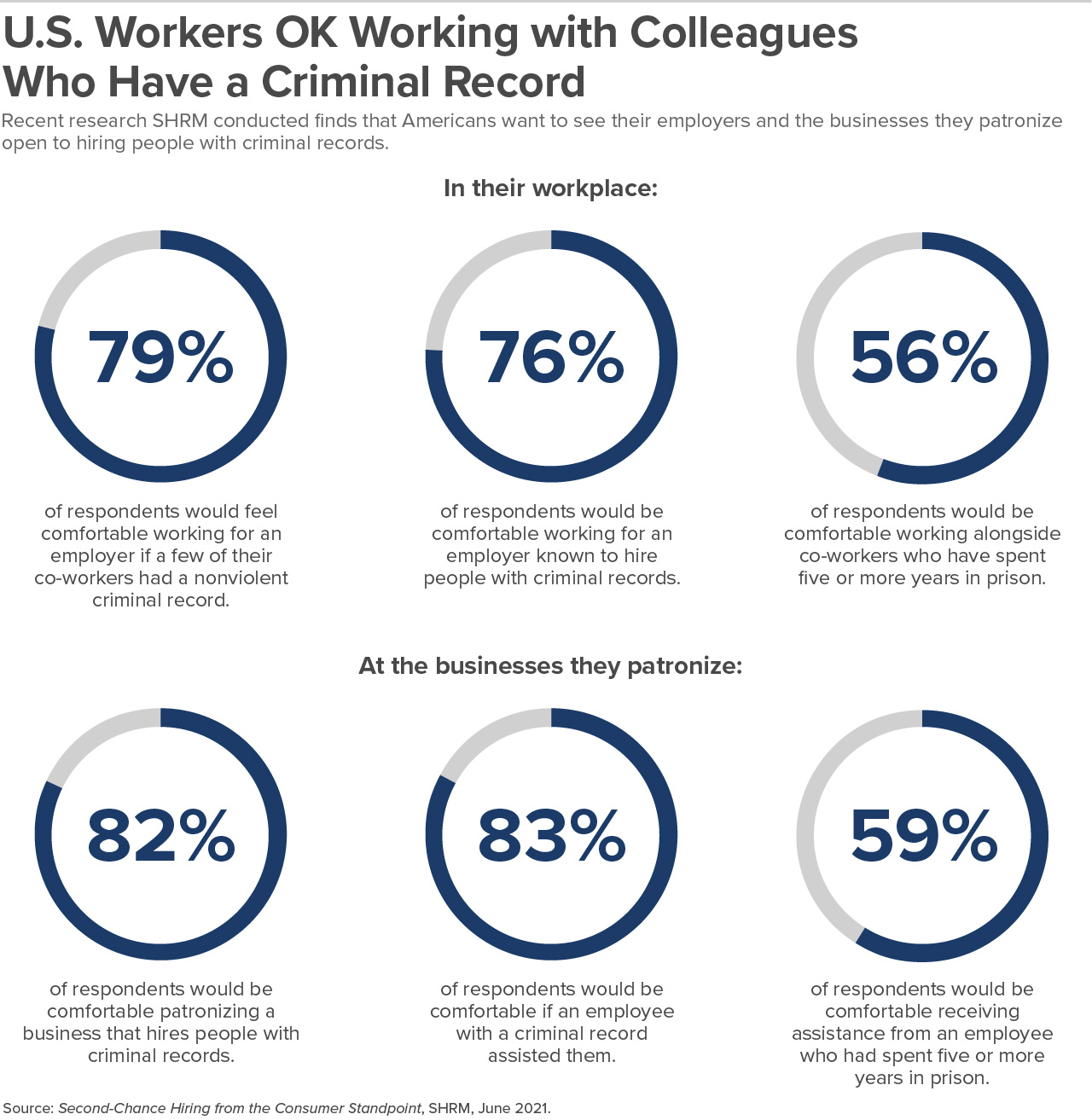
By Kathy Gurchiek
July 27, 2021 - SHRM
Baby Boomers retiring at unprecedented rates and the
Great Resignation of other workers - including many in health care and high-tech positions - are adding to hiring headaches for employers looking for qualified candidates to fill jobs.
One talent pool that is often overlooked: people with criminal records.
Recent research from the Society for Human Resource Management (SHRM) and the SHRM Foundation found that people in the U.S. embrace the idea of second chances and would be proud to work for an employer - and would patronize a business - that hires people who have a criminal record or who have been incarcerated.
"Nearly 700,000 people are released from prison each year, but too often they are denied the opportunity to put their skills to work due to deeply rooted biases and harmful misperceptions," said Johnny C. Taylor, Jr., SHRM-SCP, SHRM president and chief executive officer, in commentary that appeared on LinkedIn.
Meanwhile, resignations are increasing among most worker age groups. Between August 2019 and August 2020, 21.5 percent of employees ages 30-35, 19.6 percent of workers ages 35-40 and 25.1 percent of workers ages 40-45 voluntarily left their jobs. The findings are from a recent analysis Visier conducted of anonymized, standardized workforce data of more than 9 million employee records from more than 4,000 companies.
Organizations that are unwilling to hire the formerly incarcerated are missing out on a variety of benefits," Taylor said, including an inclusive and diverse workforce, stronger communities, and a chance to demonstrate that they're good corporate citizens.
What Employers Can Do
President Joe Biden proclaimed April as Second Chance Month to help people with criminal backgrounds successfully re-enter society.
He called on employers and others to remove barriers that prevent people with criminal histories from getting jobs and to implement quality job training during incarceration.
One obstacle is job applications that ask applicants if they have a criminal record.
New federal legislation introduced in March would encourage states to implement "ban-the-box" policies that prohibit employers from asking about criminal history before making a job offer.
Thirty-six states and Washington, D.C., have policies banning the box, according to the National Employment Law Project.
For employers looking to hire people with criminal records, "the population is already in plain sight・ in 3 Americans have some kind of record which may be a barrier [to employment]," said Elizabeth Speck, principal at MindOpen Learning Strategies LLC.
She will be among the panelists discussing
"Talent Outside the Box: Fair Chance Leadership Lessons" during the SHRM Talent Conference & Expo on Aug. 25 in Las Vegas.
A disproportionate number of Americans who are incarcerated are Black and brown, Speck said, and the term "fair-chance hiring" specifically addresses structural racism and how people with criminal backgrounds are deliberately devalued and marginalized from seeking job opportunities.
Recruiting, Hiring Tips
"Have a [hiring] strategy," Speck advised. "See it as part of your DE&I [diversity, equity and inclusion] picture" instead of merely a compliance issue. She offered the following suggestions:
"If you give someone with a criminal record a good [application] experience, even if you don't hire them, if you're humane, you have empathy, that will get around," Speck said.
Job Fairs
Employers looking to expand their hiring search should consider job fairs, said Tarik Greene.
He is co-founder and co-executive director of M.A.D.E. Transitional Services in Haverstraw, N.Y., where he oversees the development of transitional services programs and partnerships. He will join Speck on the SHRM panel.
Greene's work has included creating and implementing the first Second Chance Job Fair in Rockland County, N.Y., and forming community partnerships with agencies that include the National Institute of Corrections.
"For so many years, employers have been throwing away applications once [job seekers] have marked that box" indicating that they were formerly incarcerated. In many cases, though, their criminal background has nothing to do with the job they are seeking, Greene said.
They may have obtained their undergraduate or master's degree while incarcerated, or became licensed plumbers, electricians, floorers or barbers. They may have developed culinary skills or risen to a supervisory position.
"The one thing employers should not do," he cautioned, "is approach [fair-chance hiring] from a standpoint of feeling sorry for this prospective employee. It's not about feeling sorry; it is about your company and your company's bottom line, and the best fit for your particular company."